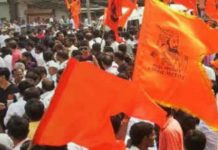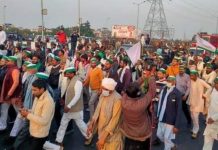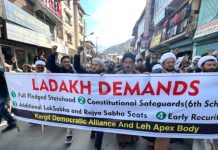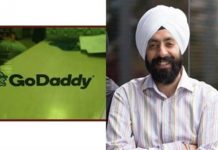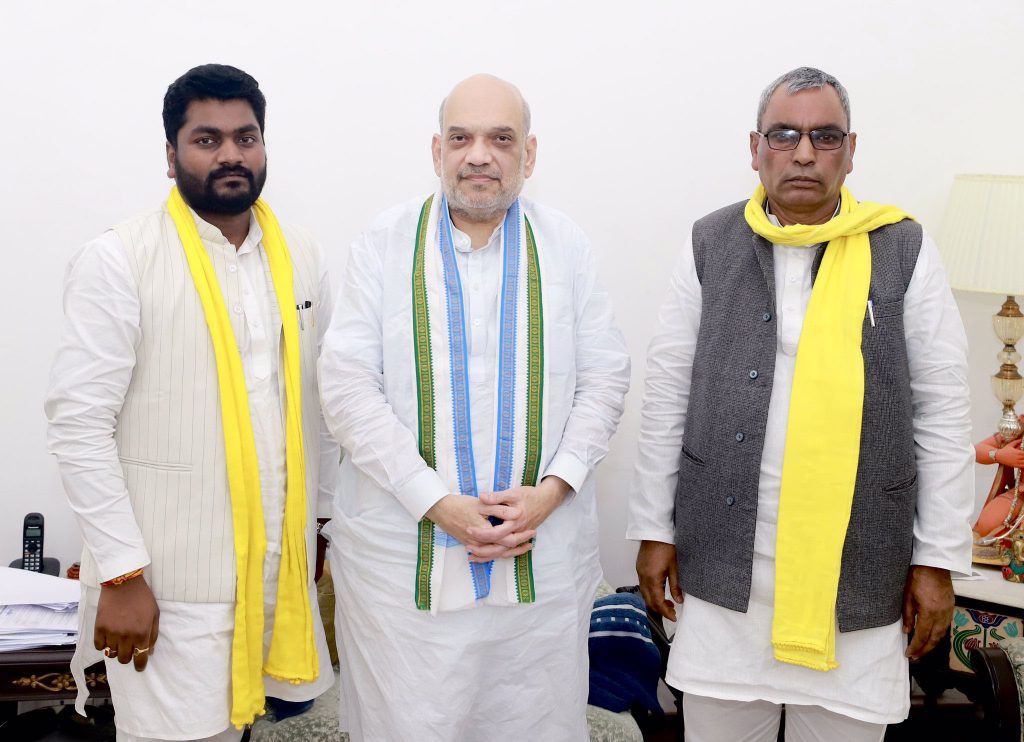
In less than a fortnight, a number of opposition leaders in UP have joined the BJP, reinforcing its poll narrative in the run-up to 2024 poll. In latest development, SP MLA Dara Singh Chauhan joined BJP days after Rajbhar’s SBSP had joined NDA as its ally. A report by Mudit Mathur
Union Home Minister Amit Shah is suddenly seen overactive in Uttar Pradesh to change the poll dynamics, once again playing the card of caste consolidation among Dalits and Other Backward Classes (OBCs). The move is aimed to overcome growing anti-incumbency visible among the masses, who are questioning the government’s fiscal policies which are resulting in heavy unemployment, price rise of essential commodities and unbearable tax burden on common man.
Political circles are keenly watching new electoral alignments with Dalit-OBC outreach, how caste configurations could overcome aspirations of the people miffed at poor implementation of its previous poll promises with regard to price rise, youth and farmers?
After the death of Samajwadi Party’s patriarch Mulayam Singh Yadav, his son Akhilesh Yadav has been entrusted with the duty to carry forward his legacy among the masses but he has utterly failed due to his failure to galvanise party workers at the grassroots. Old guards of Samajwadi movement are feeling isolated in the new scheme of things. BJP leadership has seriously planned to fill the vacuum by wooing back OBC leadership that Akhilesh Yadav brought together in the 2022 state assembly elections.
However, now most of them have defected to the BJP in view of time-tested modus operandi of the “Chanakya” (master strategist) of the BJP, Amit Shah, who has been cutting into the support base of Samajwadi Party among the OBCs including its Yadav leadership. Shah is considered to be an expert in the art of manoeuvring its support base by toppling governments in many states like Madhya Pradesh, Goa, Maharashtra and some north eastern states. Now, the biggest challenge is Uttar Pradesh where in the last assembly elections, the results of eastern UP were below the satisfaction mark.
The BJP’s recent tie-up with Suheldev Bharatiya Samaj Party (SBSP) ensued after the latter’s chief, Om Parkash Rajbhar met Amit Shah in New Delhi, months after breaking up with the Akhilesh Yadav-led Samajwadi Party. It had contested the last assembly polls in UP in alliance with the SP. Though it won only six seats, it took away Rajbhars, a “most backward caste” with an important presence in eastern UP, causing huge loss to BJP in the region. The Deputy Chief Minister Brijesh Pathak played conduit to reconcile differences and brought back Rajbhar, who is a firebrand orator. SBSP’s clout among OBC voters, particularly in eastern UP belt is seen as a win-win situation for BJP.
The BJP emerged as a dominant political force in UP after Modi led the party to its second term majority in 2019 Lok Sabha polls but in the 2022 assembly polls, the Samajwadi Party managed to dent its prospects in the ‘poorvanchal’ (eastern) region by aligning with the Rajbhars, a rival faction of Apna Dal.
In less than a fortnight, many leaders from the opposition camp have joined the BJP in two phases, reinforcing its poll narrative in the run-up to 2024 Lok Sabha elections. Last week, SP MLA Dara Singh Chauhan quit the Assembly and joined BJP days after Om Prakash Rajbhar, leader of Suheldev Bhartiya Samaj Party (SBSP) had joined BJP-led NDA as its ally.
The Uttar Pradesh, which emerged BJP stronghold since 2014, Rajbhar joins OBC leaders like Sanjay Nishad, who enjoys influence among boatmen and fishermen communities, and Union Minister Anupriya Patel of Apna Dal (Soneylal), a party with support mostly among backward Kurmis. While Nishad had aligned his ‘Nishad’ party with the BJP ahead of the 2019 Lok Sabha polls, Patel has been a BJP ally since 2014.
Many Samajwadi Party leaders have joined BJP, questioning the ability of Akhilesh Yadav to carry forward the legacy of Mulayam Singh Yadav, who has struggled to build strong Yadav-Muslims alliance and other backward castes consolidation under his leadership. Shalini Yadav, daughter-in-law of former Union Minister, Shyam Lal Yadav, during the Congress regime contested on Samajwadi Party ticket from Varanasi against Prime Minister Narendra Modi, but now she joined BJP. She secured 18 percent votes against Modi. She had earlier contested the mayoral election from Varanasi on a Congress ticket but lost. Yadav and her family’s past association with various parties may help BJP consolidate Yadav votes in the region.
The defection of senior SP leaders like Sahab Singh Saini and former RLD MLA Rajpal Singh Saini, too, could help the BJP reinforce its base in west UP. Sahab Singh, a key political leader in Saharanpur, was an SP MLC and minister in the Akhilesh government. He started distancing from Akhilesh last year and later formed his outfit, Rashtriya Krantikari Morcha. SP MLA from Machhlishahr seat, Jagdish Sonkar, both in Jaunpur, too defected to BJP.
Rajpal Saini started his political career with BSP and won from Morna seat in Muzaffarnagar. He later joined SP and then RLD. In 2022, he contested from Khatauli on an RLD ticket but lost to BJP’s Vikram Saini. Saini was also Rajya Sabha MP (2010-2016) from RLD.
Some OBC leaders from the BJP, including Dara Singh Chauhan, had defected to the SP to boost its outreach to non-Yadav backwards and Chauhan’s decision to quit as an MLA and likely return to his former party marks yet another setback to the opposition at crucial juncture.
Former BSP MLA from Mungra Badshahpur, Sushma Patel also joined BJP. Patel is a Kurmi, an OBC sub-caste having a sizeable presence in east UP, Bundelkhand and Vindhyanchal region. She defected to SP in 2022 and contested from Mariyahu seat but lost. Among others who joined the BJP on 24th July included former BSP leaders from Sitapur and Muzaffarnagar, Pushpendra Pasi and Sivansh Saini, respectively, and Congress leader Rajeev Bakshi.
The induction of Anshul Verma could help the BJP firm up its foothold amongst Dalits in and around Hardoi. Verma won from Hardoi seat on a BJP ticket in 2014 but joined the SP after being denied a ticket in 2019 Lok Sabha polls. He reportedly fell out with BJP leader Naresh Agarwal, who wields considerable influence in the district.
Eyeing upcoming state assemblies’ elections including Rajasthan, Madhya Pradesh, Chhattisgarh, Telangana and Mizoram, the BJP has resolved in its Jodhpur conclave to consolidate OBCs into the BJP’s mainstream politics. Since the Mandal Commission recommendations, OBCs constitute 54% of the Indian population and play a decisive role in elections. Since assuming power at the Centre in 2014, the BJP has inducted 27 ministers belonging to different castes within the OBC category.
The eastern UP is adjoining territories of Bihar where BJP outreached to align with Kushwaha leader Upendra Kushwaha and former chief minister Jitan Ram Manjhi, whose Manjhi community is part of Dalits. Both have left the RJD-JD(U)-Congress-Left alliance and joined the BJP-led NDA. Manjhi has already joined the NDA while Kushwaha has also had several meetings with senior BJP leaders. The BJP has also roped in Chirag Paswan, whose Lok Janshakti Party (R) enjoys the support of Paswans, the major Dalit community in Bihar.
Similar efforts for outreach to OBC communities in other states are going on in the BJP structure under overall supervision of Home Minister Amit Shah. While addressing a ‘Jan-Swabhiman Divas’ programme on the 74th birth anniversary of the late Apna Dal founder Sone Lal Patel in Lucknow, Amit Shah asked National Democratic Alliance (NDA) workers to pledge to make Prime Minister Narendra Modi the PM again in 2024. BJP OBC Morcha National General Secretary Dr Nikhil Anand said, “The front takes pride that PM Modi has emerged as a champion of OBCs after granting constitutional status to the National Commission for Backward Castes”.








